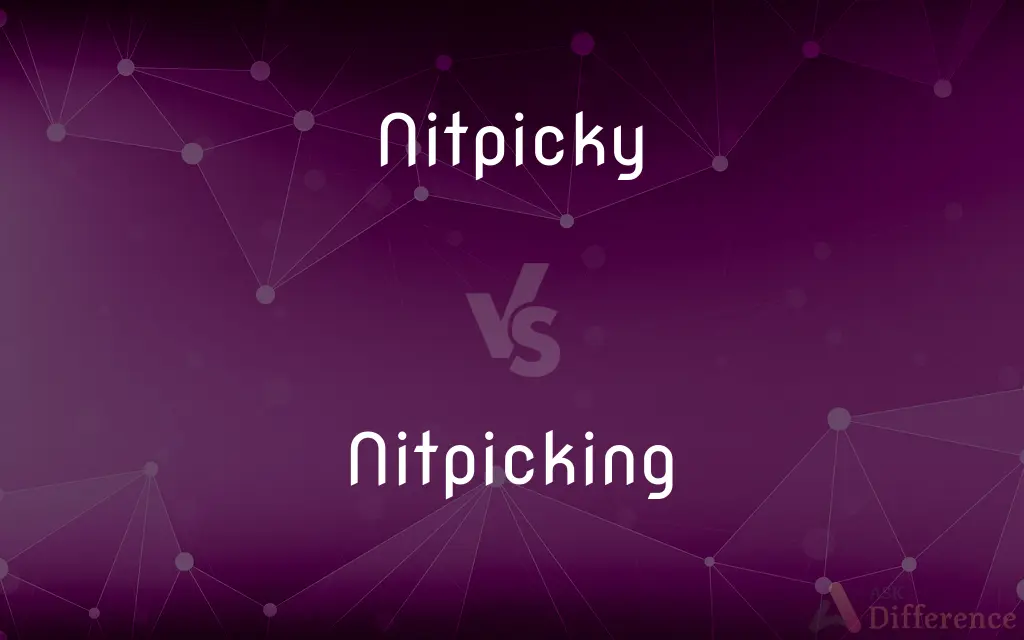Nitpicky vs. Nitpicking — What's the Difference?
By Tayyaba Rehman & Urooj Arif — Updated on April 25, 2024
Nitpicky describes a person overly concerned with trivial details, while nitpicking refers to the act of excessively focusing on minor faults.

Difference Between Nitpicky and Nitpicking
Table of Contents
ADVERTISEMENT
Key Differences
Nitpicky is an adjective used to describe someone who is excessively meticulous about small details, often annoyingly so. On the other hand, nitpicking is a gerund or verbal noun that describes the action of being overly critical about inconsequential details.
While nitpicky generally refers to a person's persistent trait, nitpicking can be situational, referring to a specific instance or behavior where someone is overly critical or focused on minutiae. For example, a person may not always be nitpicky but might engage in nitpicking under certain circumstances.
Nitpicky often carries a negative connotation, implying that the attention to detail is unnecessary and bothersome. In contrast, nitpicking might be viewed as either a constructive or annoying action, depending on the context and the observer's perspective.
The use of nitpicky can characterize a person's overall approach to tasks and interactions, suggesting a habit of making fine distinctions. Whereas nitpicking can be seen as an occasional activity, one that might occur during specific tasks like proofreading or quality control.
Nitpicky and nitpicking both originate from the same conceptual base of seeking out small or trivial faults, but they differ in how and when they are applied personally as a trait versus situationally as an action.
ADVERTISEMENT
Comparison Chart
Definition
Describing a person's trait of being overly critical about minor details.
The act of excessively focusing on minor faults.
Usage
Adjective describing a personality trait.
Gerund describing an action.
Connotation
Generally negative, suggests annoying behavior.
Can be negative or constructive, depending on context.
Frequency
Implies a habitual behavior.
Can be occasional or situational.
Example Context
Used to describe a person's general approach.
Used to describe a specific action or behavior.
Compare with Definitions
Nitpicky
Overly concerned with minor details, often unnecessarily.
He's nitpicky about his food presentation.
Nitpicking
Criticism focused on trivial aspects.
Nitpicking during reviews can demoralize the team.
Nitpicky
Characterized by a tendency to find small faults.
Her nitpicky nature makes group projects challenging.
Nitpicking
Engaging in detailed and trivial criticism.
Their nitpicking of the proposal seemed endless.
Nitpicky
Inclined to criticize by focusing on inconsequential details.
As a nitpicky editor, she corrected every minor error.
Nitpicking
To find faults in things that are otherwise acceptable.
He's always nitpicking, even when things are well done.
Nitpicky
Fastidious to a fault.
His nitpicky attention to grammar annoys his friends.
Nitpicking
The act of pointing out small or unimportant errors or faults.
She spent the meeting nitpicking over the document’s format.
Nitpicky
Habitually engaged in meticulous criticism.
His nitpicky behavior is evident in all his emails.
Nitpicking
Excessive concern with minor details when reviewing or assessing.
Her nitpicking saved us from a costly mistake in the contract.
Nitpicky
Overly concerned with insignificant details
A nitpicky supervisor.
Nitpicking
Nitpicking is a term, first used in 1956, that describes the action of giving too much attention to unimportant detail. A person who nitpicks is termed as a nitpicker.The terminology originates from the common act of manually removing nits (the eggs of lice, generally head lice) from another person's hair.As nitpicking inherently requires fastidious attention to detail, the term has become appropriated to describe the practice of meticulously searching for minor, even trivial errors in detail .Nitpicking has been used to describe dishonest insurers, and bullying employers.
Nitpicky
Characterized by petty fault-finding
Nitpicky complaints.
Nitpicking
To be concerned with or find fault with insignificant details.
Nitpicky
Finicky; overly critical; concerned with insignificant details.
Nitpicking
To criticize or find fault with (someone or something) in a petty way.
Nitpicking
The painstaking process of removing nits (lice eggs) from someone's hair.
Nitpicking
A process of finding or pointing out tiny details or errors, particularly if the pointed-out details seem insignificant or irrelevant to all but the finder.
"Of all life's pleasures, I like nitpicking the best." -- Wally in Dilbert
Nitpicking
Quibbling over insignificant details;
Caviling pettifoggers and quiggling pleaders
Her nagging and carping attack
Thought her editor unnecessarily nitpicking
A pettifogging lawyer's mind
Had no patience with quibbling critics
Common Curiosities
What does it mean to be nitpicky?
Being nitpicky means having a habitual focus on trivial or minor details, often to the point of annoyance.
Can nitpicking ever be positive?
Yes, in contexts like editing or quality assurance, nitpicking can be positively viewed as attention to detail.
What is nitpicking?
Nitpicking is the act of excessively focusing on minor faults or details, often unnecessarily.
Is being nitpicky a permanent trait?
While often seen as a trait, how nitpicky someone is can vary depending on the situation or environment.
How can one stop nitpicking?
Focusing on the big picture and prioritizing issues by significance can help reduce nitpicking behavior.
Why do people perceive nitpicky individuals negatively?
Because their focus on minor details can be seen as obstructive, unnecessary, and annoying.
Is nitpicking the same as being detail-oriented?
No, being detail-oriented is generally positive and necessary, whereas nitpicking is overly critical and often negative.
What are examples of situations where nitpicking is unwelcome?
In creative processes or during collaborative team efforts, nitpicking can hinder progress and morale.
How can nitpicky behavior affect relationships?
It can strain relationships if one party constantly focuses on trivial faults of the other.
Can nitpicky attitudes be beneficial in any professions?
In professions requiring precision like editing, programming, or law, a nitpicky attitude can be beneficial.
Share Your Discovery

Previous Comparison
Twelfth vs. Twelve
Next Comparison
Pancake vs. FlapjacksAuthor Spotlight
Written by
Tayyaba RehmanTayyaba Rehman is a distinguished writer, currently serving as a primary contributor to askdifference.com. As a researcher in semantics and etymology, Tayyaba's passion for the complexity of languages and their distinctions has found a perfect home on the platform. Tayyaba delves into the intricacies of language, distinguishing between commonly confused words and phrases, thereby providing clarity for readers worldwide.
Co-written by
Urooj ArifUrooj is a skilled content writer at Ask Difference, known for her exceptional ability to simplify complex topics into engaging and informative content. With a passion for research and a flair for clear, concise writing, she consistently delivers articles that resonate with our diverse audience.
















































